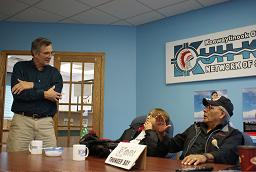Niigaanibatowaad- Frontrunners torch bearer shares story via videoconference
Rick Garrick Sept. 15, 2008
 The story of one of the 10 First Nation torch bearers who was not allowed to carry the 1967 Pan Am Games torch into the stadium is now posted on the KORI Media Player. "We thought we would run in the torch," says the Sagkeeng First Nation citizen who helped run the torch over 800 kilometres of ancient messenger trails from Saint Paul, Minn., to Winnipeg, Man. "But woe and behold, the torch was taken away from us. It was handed to an athlete from the games and he took it in. We were thanked, but we were not brought into the stadium."
The story of one of the 10 First Nation torch bearers who was not allowed to carry the 1967 Pan Am Games torch into the stadium is now posted on the KORI Media Player. "We thought we would run in the torch," says the Sagkeeng First Nation citizen who helped run the torch over 800 kilometres of ancient messenger trails from Saint Paul, Minn., to Winnipeg, Man. "But woe and behold, the torch was taken away from us. It was handed to an athlete from the games and he took it in. We were thanked, but we were not brought into the stadium."
Patrick Bruyere, who at 18 was the oldest runner in the group and is now one of the actors in a film about their experiences, entitled Niigaanibatowaad- Frontrunners, dropped in at the Keewaytinook Okimakanak Research Institute office in Thunder Bay to share his story with Keewaytinook Internet High School students and teachers in Poplao Hill, Weagamow and Fort Willaim First Nation via K-Net's northern Ontario videoconference network.
"This is a first for me," Bruyere says about participating in the videoconference. "This story is about 10 runners who were chosen to run the torch from Saint Paul to Winnipeg." The runners were chosen according to their athletic ability and marks in school. "As an individual, you did not run the whole 500 miles yourself," Bruyere says. "We had stops along the way ... and handed the torch on to the next guy, sort of like a relay."
Although eight of the runners carried in the Canadian and Pan Am Games flags, the honour of carrying the torch into the stadium was given to an athlete from the games. "At the time we just took it in stride and accepted the thanks," Bruyere says. "Being raised in residential school, you didn't ask questions and did what you were told. I didn't think anything at the time." But that situation changed in 1999 when the Pan Am Games were scheduled to return to Winnipeg and people began asking questions, which led to an apology from the Manitoba government for the runners' treatment in 1967. While Bruyere and six of the other runners were carried into the stadium in war canoes during a special ceremony honouring their 1967 run, it wasn't the same for Bruyere because his parents had passed away in the 1980's and were not there to share the experience. "My mom and dad were not there to witness it," he says.
Bruyere and the other runners met journalist and former national team cyclist Laura Robinson at the games and later participated in interviews with her about the run and their residential school experiences as she gathered material to write a two-act play, which was eventually filmed in 2007 for the Aboriginal Peoples Television Network. "Her interest was in what had happened in 1967, but also to uncover some of what happened in residential school," Bruyeres says, explaining that the play and film discuss many issues about residential school in addition to the runners' experiences. "There are a lot of stories that came out about residential school."
The film has since been screened in British Columbia, Calgary, Winnipeg, Toronto and a number of smaller communities and the play has been across Canada and to Scandinavia. Bruyere also spoke about the importance of keeping the languages alive and encouraging inner gifts as a means of instilling pride in the youth. "Each and everyone of us are born with a gift," Bruyere says. "We all excel in something. Throughout our journey, we can find that special gift we carry around to help us in our lives."
KORI research assistant Martine Kanakakeesic noted that although high school students from NAN's fly-in communities are now able to fly home for the weekend whenever they want, there are opportunities for students to study within their own communities through KiHS. "Now that we have Internet high school services through KiHS, students who are not ready to leave home can stay at home and learn over the Internet until they are ready to leave the community," Kanakakeesic says.
The Niigaanibatowaad- Frontrunners DVD is available from the National Film Board of Canada at at www2.nfb.ca, and the play is available from the Brucedale Press at www.bmts.com/~brucedale/, and KO director of research Brian Walmark added that Bruyere's discussion will be archived and posted on the KORI Media Player so students and others who didn't have an opportunity to attend the videoconference will be able to access his story in the future. "I am happy you came and shared your story with the KiHS students and teachers," Walmark says. "I think our students will carry your story and teachings with them for a long time."
| Preview | Attachment | Size |
|---|---|---|
| Niigaanibatowaad- Frontrunners.pdf | 24.75 KB |
